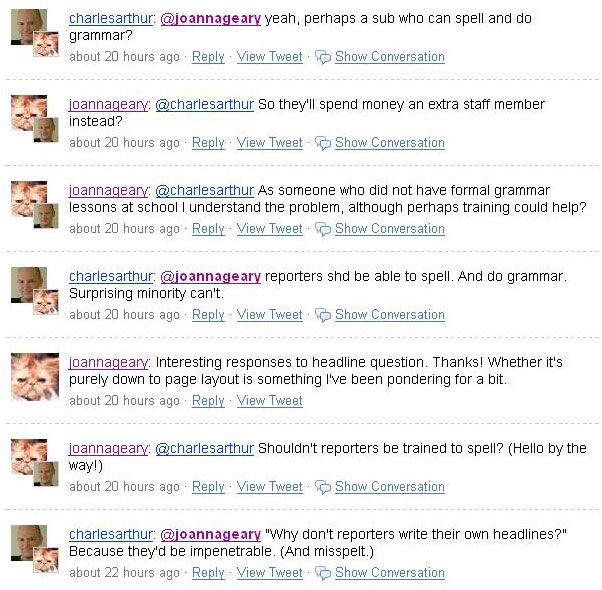
It’s the question I asked on Twitter yesterday.
Some people found it a perfectly comfortable question to debate, others seemed to find it irritating.
If I am being naive then I would dearly love someone to fill me in.
So far, my thinking is that reporters do not write headlines because of the nature of print production i.e. because they are not the ones that lay the story out on a page and therefore do not know what space they have/what other articles are on there.
It surely can’t be because reporters are not expected to grasp spelling, punctuation and grammar?!
The public responses to my question (or the ones that I could find on Twitter Search) are copied and pasted below in reverse chronological order. (Wouldn’t it be lovely to have an app that collated responses to you on Twitter over a specified period of time.)




Great question. Some might regard it as dangerous, but it is undoubtedly another of the difficult ones the industry will have to face sooner or later.
I’m not about to suggest do away with subs because experience tells me that you need several pairs of eyes checking stories before they get published.
A good sub can also turn a pig’s ear of a story into a silk purse (although I’ve known some to do the opposite).
I used to “suggest” my own headlines and standfirsts on features as it seemed an obvious thing to do and I’d check space and position on page beforehand. But I also wanted it subbed by others.
Subs still have an important role to play and I would be happy to argue that they should be looking at blogs linked to their own title/organisation too. What’s the point in having a style and standards in the paper and the online version, if you then get basic mistakes on the blogs. Some might argue that blogging is different, but the credibility of the media organisation doesn’t change.
But I guess I’m still too old school in my ways.
It is the point I said above – that the journalist would write a completely inside-the-story headline which might not mean much to the average reader.
Subs pride themselves on headlines that will inform the reader to the extent they might not need to read the story itself. (Reporters find this rather frustrating. They like their story to be necessary reading, even if you have to read the story to understand the headline.)
I say this btw as someone who’s never really been a sub – always a reporter/writer and now editor. Sure, I write my own “headlines” for blog posts. (And sometimes it’s really successful, or at least I’m proud of it: “O2 opens brewery, forgets bottles” for the iPhone debacle.)
Could subs report? Backbenches do all the time, pulling together wire stuff on breaking news. Though these days they’d do well to use Twitter etc too. The scope of subbing is changing, just as that of reporting is. But headlines? It’s a war zone.
Hi Joanna, I’m a print and web sub who’s been replying to your tweets on this but think I’m caught in the whirlpool of following / not being followed.
From experience, I’d say the client sites I’ve worked on are less subbed because time has not been booked into the production process to allow for even a basic check. Result: unclean copy, dulls lead-ins, unchecked facts, potential legal issues, etc etc… Why is subbing suddenly seeming unimportant when the need for it still exists – esp with recent online libel wins? Plus, outside publishing, people are usually unaware of subs and sub-editing. One comms office I now sent their mag home with a receptionist to proofread on the bus. Sigh.
Re headlines, it’s not just down to page layout, getting a balance of headlines, or fitting the house style or SEO needs, etc. Sometimes subs find the point buried half way down a story, a slight rewrite ensues and where the body goes then so must the head follow.
I also agree (having done both) that writing and subbing are totally different skill and mindsets. No reason why a reporter, or a sub, can’t be flexible and do both – but the fact is some writers don’t want to know the ins and outs of semi-colon usage while some subs would freak at the thought of interviewing a Burger Boy.
Now how do I get onto your tweet radar, lady!
PS And that would be ‘know’ not ‘now’. Sorry, can’t help myself. x
Duly followed! 🙂
You missed this one: http://twitter.com/pigsonthewing/statuses/873623705
though you did reply to it at the time.
Pingback: One Man and His Blog
There’s a lot more to a decent headline than decent spelling, punctuation and grammar. A headline has to be great, or at least good, or very few people will read the story. Plenty of reporters, even the great ones, are not great writers. Writing and reporting are not the same thing.
It’s a “dangerous question” because reporters writing their own headlines would mean fewer subs being employed, but as Paul Groves says, that doesn’t mean it won’t get asked and, one day, answered!
Pingback: Why the world needs subs « Subs’ standards
Pingback: Should reporters write headlines? A retraction… « Subs’ standards
And on the subject of great headlines… I’ve just written a retraction after discovering a reporter suggested one of the all-time greats: http://subsstandards.wordpress.com/2008/08/09/should-reporters-write-headlines-a-retraction/
It’s the headline that’s important not who writes it.